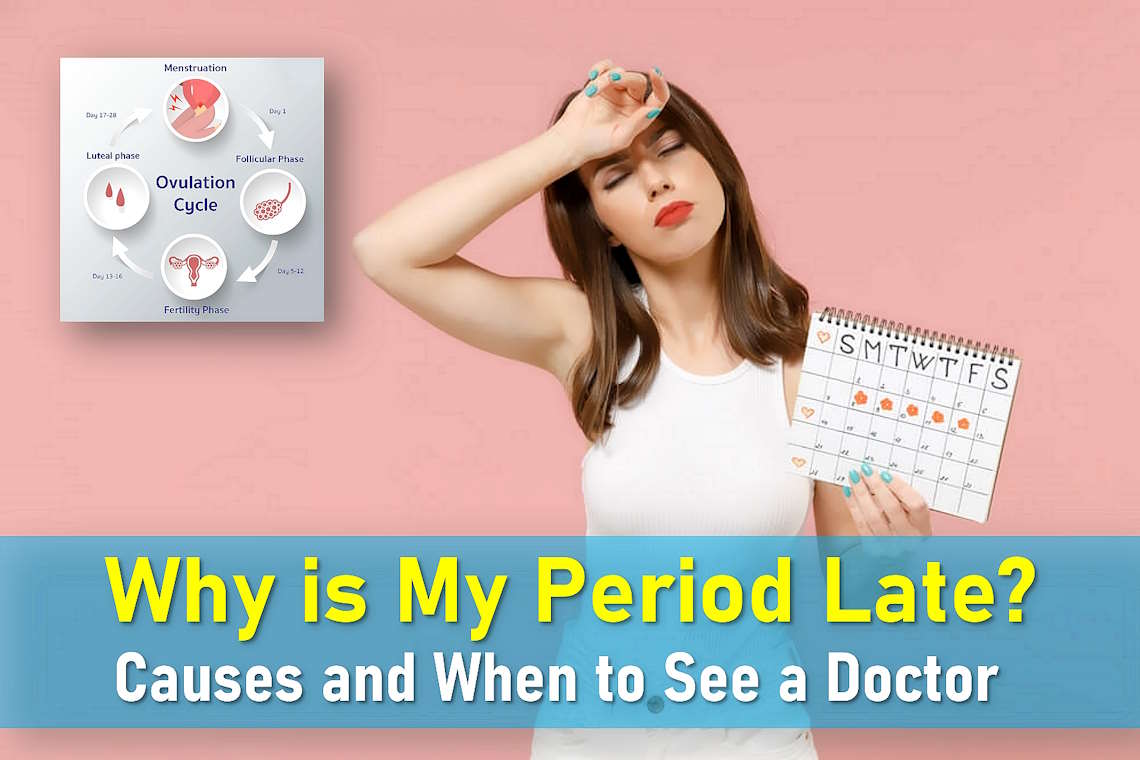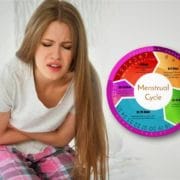Why Is My Period Late? Common Causes and When to See a Doctor
Missing a period can be unsettling, especially if pregnancy isn’t a factor. However, a late period isn’t always a cause for concern. Many people experience occasional delays due to harmless, temporary reasons. If you’ve ruled out pregnancy and feel otherwise healthy, skipping one or two cycles may not indicate a serious issue.
That said, if your period is absent for three to six months or you experience unusual symptoms, it’s best to consult a doctor. Teens may also face delays, if menstruation hasn’t started by age 16 (or by 14 without puberty signs like breast development), medical evaluation is recommended. Likewise, irregular bleeding between periods, after sex, or following menopause warrants professional advice.
Understanding the Menstrual Cycle
Knowing how your menstrual cycle works can help explain why your period might be late. The cycle begins on the first day of menstruation and ends just before the next period starts. While the standard cycle is 28 days, normal variations range from 21 to 35 days. In reality, only about 16% of people have a perfectly timed 28-day cycle.
Periods typically last between two and seven days, and small variations in cycle length are common. However, if your cycle fluctuates by more than seven to nine days regularly, it may be considered irregular. Tracking your periods with an app or calendar can help identify patterns and alert you to potential concerns.
Common Reasons for a Late or Missed Period
Wondering, “How late can a period be without pregnancy?” Several factors can influence your cycle. Here are some of the most common causes:
Stress and Menstrual Delays
If you’re wondering, “Can stress delay your period?”, the answer is yes. Emotional stress from work pressure, grief, or financial worries, as well as physical stress from illness or surgery, can raise cortisol levels. This hormone disrupts ovulation, leading to a late period even if pregnancy isn’t a factor. Short-term stress may delay menstruation by a few days, while chronic stress can cause missed cycles altogether. Managing stress through relaxation techniques like yoga, meditation, or therapy may help restore regularity.
Weight Changes: Too Low or Too High
Sudden weight loss or a low body mass index (BMI) below 19 can halt periods. This is common in individuals with eating disorders like anorexia or in athletes experiencing Relative Energy Deficiency in Sport (RED-S). On the other hand, excess weight can disrupt estrogen levels, leading to irregular cycles. Maintaining a balanced weight through proper nutrition and exercise can support a healthy menstrual cycle.
Excessive Exercise
Over-exercising, especially in high-intensity training like marathon running or gymnastics, can lead to missed periods. The body prioritizes essential functions over reproduction, suppressing reproductive hormones to conserve energy. If your period is missing for an extended time due to intense workouts, consider reducing intensity and consulting a healthcare provider to prevent issues like bone density loss.
Puberty and Perimenopause
Irregular cycles are common in teenagers during the first couple of years after their first period. Similarly, perimenopause, the transitional stage before menopause, often causes unpredictable cycles due to fluctuating hormone levels. While these changes are typically normal, it’s important to seek medical advice if you experience severe symptoms like excessively heavy bleeding.
Birth Control and Its Effects on Your Cycle
Hormonal birth control can cause late or missed periods. Some progestin-only pills, hormonal IUDs, injections, or implants may stop menstruation entirely while in use. If you’ve recently stopped birth control, the time it takes for your cycle to return varies:
- Birth Control Pills: Periods usually return within 1–3 months.
- Injections: It can take 6–12 months for cycles to normalize.
- Implants or IUDs: Most cycles return within 1–2 months after removal.
Medications and Medical Treatments
Certain medications and medical procedures can also lead to delayed or missed periods. These include:
- Antidepressants (SSRIs, SNRIs)
- Antipsychotic medications
- Chemotherapy drugs
- Opioid pain medications
- Some anti-nausea medications
Medical treatments like hysterectomy (removal of the uterus) will permanently stop menstruation, while endometrial ablation (removal of the uterine lining) can temporarily pause it. Cancer treatments, including radiation and chemotherapy, may also affect ovarian function, leading to prolonged cycle irregularities.
Polycystic Ovary Syndrome (PCOS)
PCOS is a common hormonal disorder that affects approximately 1 in 10 women and is a leading cause of irregular periods. This condition disrupts ovulation and may cause cycles to be infrequent or completely absent. Other common symptoms include:
- Menstrual symptoms without actual bleeding (cramps, bloating)
- Excess facial or body hair
- Unexplained weight gain
- Acne or oily skin
- Thinning hair on the scalp
If you suspect PCOS, a doctor can diagnose it through blood tests and ultrasounds. Treatment often includes lifestyle modifications such as a balanced diet and regular exercise, and in some cases, hormonal therapy.
Perimenopause: The Transition Phase
Perimenopause is the transitional phase leading up to menopause. While menopause typically occurs around age 51, perimenopause can start as early as your mid-30s, and lasting 4 to 10 years. During this time, your estrogen and progesterone levels fluctuate, causing changes in your menstrual cycle, including:
- Shorter or longer cycles
- Lighter or heavier bleeding
- Missed periods followed by normal cycles
It’s important to note that you can still get pregnant during perimenopause unless you’ve gone 12 full months without a period.
Primary Ovarian Insufficiency (POI)
Primary Ovarian Insufficiency (POI), formerly known as premature ovarian failure, occurs when the ovaries stop functioning normally before age 40. Unlike menopause, POI may be temporary, with periods sometimes returning. Common symptoms include:
- Hot flashes
- Vaginal dryness
- Difficulty conceiving
POI is rare, affecting about 1% of women, but if you’re under 40 and haven’t had a period for 2 months or more (and you’re not pregnant), it’s important to seek medical advice.
Thyroid Disorders
Your thyroid plays a role in regulating metabolism and reproductive hormones. Both hypothyroidism (underactive thyroid) and hyperthyroidism (overactive thyroid) can affect your menstrual cycle. Common effects include:
- Delayed periods with a negative pregnancy test
- Very heavy or light bleeding
- Shorter or longer cycles
Thyroid problems can be diagnosed through blood tests and are typically treated with medication.
Breastfeeding and Menstrual Cycles
Breastfeeding, especially exclusive breastfeeding, can delay the return of your period due to the hormone prolactin, which stimulates milk production and suppresses ovulation. However:
- Your period usually returns within 6-8 weeks if you’re not breastfeeding
- If breastfeeding exclusively, it may take months to a year for periods to return
- It’s possible to ovulate before your first postpartum period
Keep in mind that breastfeeding is not a reliable form of birth control.
Pregnancy: The Most Common Cause of Missed Periods
Pregnancy is the most common reason for a missed period. If you’re sexually active and your period is more than 7 days late, it’s worth taking a home pregnancy test. Modern pregnancy tests can detect the pregnancy hormone (hCG) as early as the first day of your missed period. To get the most accurate result:
- Use your first-morning urine when hCG levels are highest
- Check the expiration date on your test
- Follow the instructions carefully
If the test is positive, schedule an appointment with your doctor to discuss your next steps and prenatal care options.
Hormonal Imbalances That Affect Your Cycle
Several hormone-related conditions can cause missed periods even when you’re not pregnant:
- Hyperprolactinemia: This condition occurs when there’s too much prolactin, often due to a benign pituitary tumor, which can stop periods and even cause milk production in non-pregnant women.
- Thyroid Disorders: Both hypothyroidism (underactive thyroid) and hyperthyroidism (overactive thyroid) can lead to irregular periods, as thyroid hormones are essential for ovulation and regular menstruation.
- Adrenal Gland Conditions: Rare disorders like congenital adrenal hyperplasia or Cushing’s syndrome can disrupt hormone production from the adrenal glands, leading to missed periods.
Genetic Conditions That Prevent Periods
Certain genetic conditions can prevent periods from starting, a condition known as primary amenorrhea:
- Turner Syndrome: A chromosomal disorder (1 in 2,500 births) that causes underdeveloped ovaries, short stature, and the absence of puberty unless treated with hormones.
- Androgen Insensitivity Syndrome: Individuals with this condition appear female externally but lack a uterus and ovaries, making menstruation impossible.
- Müllerian Agenesis: This condition, which affects 1 in 5,000 women, means a woman is born without a fully developed vagina or uterus, and periods will not start by age 16.
When to See a Doctor
Occasional delays in your period are usually not a cause for concern, but there are times when you should reach out to a healthcare provider. It’s a good idea to consult a doctor if:
- You’ve missed three or more consecutive periods without being pregnant.
- Your cycles are frequently irregular and unpredictable.
- You experience unusual symptoms such as severe pain, heavy bleeding, or excessive hair growth.
- Your period hasn’t started by age 16, or you haven’t shown signs of puberty by age 14.
Tracking your menstrual cycle and being mindful of lifestyle factors can help you notice patterns and identify potential issues early. If you’re ever unsure, consulting a healthcare professional is always a wise choice.
Final Thoughts
A late period can be unsettling, but remember that occasional irregularities are common and often resolve on their own. By tracking your cycles and symptoms, you can spot patterns that may be worth discussing with your doctor. Whether stress, hormonal changes, or lifestyle factors are to blame for your late period, most causes are treatable with proper care. If you’re ever concerned about your menstrual health, don’t hesitate to seek advice from a healthcare provider—your body’s signals are always important.
FAQs About Late Periods
Can traveling or jet lag delay my period?
Yes. Changes in time zones and sleep patterns can affect the hormones that regulate your cycle, potentially leading to a 3-5 day late period.
Does COVID-19 or the vaccine affect menstrual cycles?
Some women report changes. The stress from illness or immune responses may cause temporary cycle irregularities, but most women find that their cycles return to normal within 2-3 months.
Can a UTI or other infections delay periods?
Usually no, but severe infections that cause significant physical stress might contribute to a delayed period.
Why do I have period cramps but no bleeding?
This is called “phantom period” symptoms. It can happen during ovulation, hormonal changes, or early pregnancy. If these symptoms persist, it’s a good idea to talk to your doctor.
Can allergies or seasonal changes affect my cycle?
Indirectly. Severe allergies that lead to sleep loss or stress may contribute to slight delays, but pollen itself does not directly affect menstruation.
Do period delays mean lower fertility?
Not necessarily. While conditions like PCOS can impact both your cycle and fertility, having occasional late periods doesn’t necessarily mean you have fertility issues. Track your cycle over three or more months if you’re concerned.
Is it normal to miss a period occasionally?
Yes. About 1 in 4 women experience occasional irregular cycles due to stress, diet changes, or minor hormone fluctuations.
Can certain drinks delay your period?
No. Despite common myths, drinks like lemon juice, pineapple, or cold water do not directly affect your cycle. However, extreme calorie restriction or alcohol abuse might cause delays.
Does alcohol stop periods?
Chronic heavy drinking can interfere with ovulation and lead to missed periods, but occasional alcohol consumption won’t impact your cycle.
Can sex delay your period?
No, but pregnancy after sex can certainly cause a missed period. The act itself doesn’t affect cycle timing.










